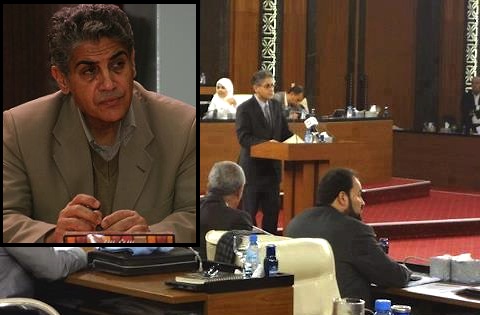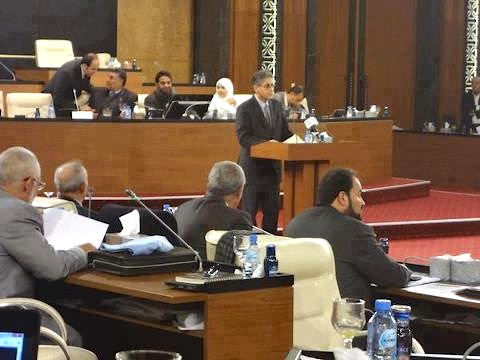By George Grant.

Tripoli, 11 December:
Interior Minister Ashour Shuwail was sworn into office by the National Congress this afternoon, Tuesday, following an . . .[restrict]overwhelming vote in support of his taking up the post before a Supreme Court ruling on whether he is eligible.
Eighty-six out of a total of 114 Congressmen voted in support of Shuwail, with 28 abstentions and none against.
The vote comes amidst a long-running investigation into Shuwail by the Integrity Commission, which initially disbarred him from office on 13 November. The minister was cleared on appeal on 3 December, but the Commission promptly lodged its own counter-appeal with the Supreme Court.
The case has prompted heated debate in Congress, including a punch-up between two Congressmen on Sunday.
In a note to the National Congress submitted on 5 December, the Commission insisted that the legislative body had no right to swear Shuwail into office until all legal proceedings against him were completed. The letter was precipitated by an announcement from National Congress Omar Hmaidan that Congress looked forward to swearing Shuwail into office now that he had been cleared on appeal.
Today’s vote was essentially intended to settle the legal question of whether Shuwail should be considered innocent until proven guilty, in which case he should be permitted to take office until such time as he is found against, or vice versa.
Nevertheless, should the Supreme Court now rule against Shuwail, he will in all probability be compelled to resign anyway.
This evening, however, Congressmen spoken to by the Libya Herald seemed fairly confident that the new interior minister would win his case at the Supreme Court.
“The case against him is not too serious”, said Hassan Esteta, independent Congressman for Derna. “I don’t think he will have a problem with the Supreme Court.”
The sentiment was echoed by Mohammed Takala, independent Congressman for Khoms: “He should be OK because what he did does not really seem to be against the rules of the integrity criteria.”
The case against Shuwail revolves around his role as head of Benghazi’s traffic police at the start of last year’s uprising. He was accused of carrying out hostile activities against the revolution on 17, 18 and 19 February 2011 when he submitted details of citizens who were protesting in Benghazi. Qaddafi’s intelligence service had requested the details of those citizens through their car and license registrations.
However, Shuwail argued that in that early period, the Qaddafi regime was very much still in place, and that the protocols and procedures to submit the information to intelligence services were likewise still effective. Even had he himself not been there, Shuwail argued, the information could easily have been passed on by others.
Moreover, Shuwail has pointed out that he was one of those involved in the formation of the Benghazi Local Council, days before the formation of the National Transitional Council. He was also one of the speakers and officials present when the NTC was formed, and one who strongly supported the appointment of Mustafa Abdul Jalil as its chairman.
A final ruling by the Supreme Court on Shuwail’s case is due within the next three weeks. [/restrict]







